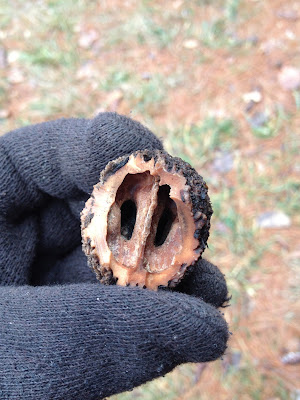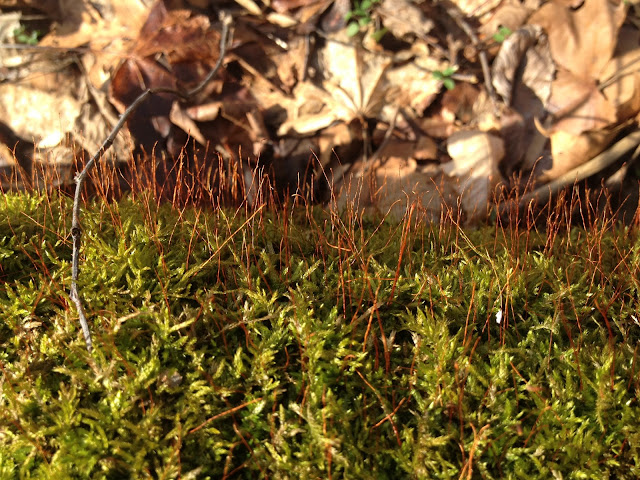Walking up and down the rows of Gina's farm, I saw baby turnips left to winter in
the fields.
I
saw broken carrots turning themselves out through the mud…
…mustard
greens, paused in full flourish, and garlic shoots bending in the bitter
breeze.
In
the woods, under the thick layer of rusty leaves, I found cracked hickory nuts
and empty black walnut shells.
I
found acorns caps and peeling river birch bark.
Walking
down the trail, the greeny underbrush was gone…just gone…and my eyes kept
catching the quartz, glowing through the thick gloom, splitting through the
damp dirt…
…its
snow-colored facets bright as a moonscape.
These are the totems of winter.
Season
of the home, season of the hearth? That’s
what I was running away from.
It
almost done me in…the interior of my urban cabin felt more and more like a
trap.
I
was lucky to escape. A shutter no more, I
was out the house, out the gate, out in the January wilds.
I’d
left the house just after sunrise and drove north through the misty dawn…
…watching
the spruce trees tower over the scattered homes, breaching through the hanging
fog.
I
parked my car next to the fence-row of hawthorns.
These
woods and this trail were very familiar to me but I’d never seen them like this
before.
Where
was I?
Here
is the path in the very heart of August…all green, all leafed out…bursting with
high ferns and long grass and wild grape…groves of flowering walkingstick trees
spilling over the trail.
This
is the same place now.
Out
here in the January wilds, there isn’t much green left and, yet, that’s exactly
what I was here to find.
I
was on a hunt that would take me far away from my cozy home and light-years
away from the world I know.
I
was trying to catch one of nature’s most persistent greens, one of the most ancient
totems of the wintering world.
I
was hunting moss.
YE OLDE MOSS
The
moss is considered part of the phylum of soft plants, characterized by their
lack of wood and their lack of roots.
It
grows in soft mats, in shady and damp environments, usually close to a water
source.
Instead
of roots, the moss stabilizes itself in place with the use of creeping tissue,
smaller than thread, called rhizoids.
It
doesn’t bear a fruit and it doesn’t need a seed. Instead, very thin filaments grow from their
soft carpets and open up at the top to release its reproductive spores.
Here,
it’s easier to see them this way.
These
distinct traits are important to note.
These characteristics, put in their proper context, help place the moss
way, way back in the long, long history of this Spaceship Earth.
Hunting
moss turns any citybilly into a paleo-botanist.
This
soft plant pre-dates just about everything that surrounds it…older than ginkgo,
older than Turtle Island, older than the very first tree, quite possibly older
than the dirt itself.
In
the history of Spaceship Earth…well, you know what? The moss pre-dates the very notion of history.
Pre-history, then?
Perhaps
the better question would be: what’s
history?
Because
the moss comes from an Earth that would be completely unrecognizable to you and me, completely alien even to the trees themselves.
This
was the early Devonian Period.
This
was about 470 million years ago. Maybe
only 420 million years ago.
The
measurement of time that we call a year has very little significance when
you’re counting back to the Devonian.
This
was over a hundred million years before the first dinosaur. There were no flying creatures, no reptiles,
no amphibians, certainly no marsupials, definitely no mammals, barely any
scorpions and hardly any insects except for the trilobite.
And,
yet, it was an Earth bursting with life.
This
was the Age of Fish.
Back
then, there was only one home. For both
fish and plants, there was only one house…the watery hearth of the global sea.
Now,
since I am two-footed, air-breathing land-lubber of a mammal, it’s hard to
imagine the world of the first moss.
Even
if I could imagine this kind of scene, even if I can picture this water-scape
in my mind’s eye, it is almost impossible to think of the Devonian world
happening on the same planet as this modern one.
And
it’s unfathomable that there are things still out there that belong to both of
those worlds.
But
that’s moss for you.
It
reminds me of the old Native American Zen story, the one where a fish bumps
into his friend, another fish.
That
fish tells his friend an amazing story…how he saw something floating on the
surface of the water…some morsel of food.
As he swam towards the food, a giant hand grabbed him and pulled him
through to the other side of the water.
The
world above the water, the fish said, was bright and dry. He tried his best to describe it all to his
friend. He tried to come up with words
that could describe the full sky, the warm sunshine, the fresh air, the moving
wind, even the very idea of a hand was impossible to convey in words…you wouldn’t believe what’s out there,
he said.
And
then, just as quickly as he’d been plucked from his world, the giant hand
dropped him and he fell through the air and he was back home, back in the
water.
Wait, his fish
friend said. What’s water?
WATER WORLD
Back
in the Devonian, the world was almost all water. In fact, it was really just one great ocean,
called the Panthalassa.
This
global ocean housed all manners of sea-creatures and fish...including the very
first sharks and sting-rays and, top of the food chain, a species of hungry,
armored fish called the placoderms.
Sure, there was some land, in the shape of very large and very unstable tectonic plates, floating around the South Pole, a few million years away from crashing into each other to form the super-continent of Pangaea.
The
first life-forms to break the spell of the watery house of the global ocean? The first life-forms to escape the sea and
make the land its home?
That’d
be moss.
Evolved from single-celled algae, the first moss would’ve looked a lot like this and it would’ve been found a lot like this…

…clamping down to wet rocks on the water’s edge and developing the traits needed to survive in this new home of fresh air and clear sunshine.
Life
out of the water? The land as a home?
This
was revolutionary, in ways that make all other revolutions seem tame and
insignificant.
Because
the moss, using photosynthesis, started absorbing the carbon dioxide in the
atmosphere and, consequently, the world’s temperature cooled, enticing other
life-forms…both plant and animal…to make a similar step out the door of their
watery home.
Moss was the game-changer.
As
the years rolled on, the world began seeing its first trees, which turned out
to be even better habitats for the moss.
Still
is.
It
might be the last thing to happen to us too…
…for
in the words of the haiku-master Basho…one dream all heroes find to be true…
…cool green
moss…
…on forgotten
tombs.
LEAVING THE MOSS
BEHIND
I
walked out of the woods behind Gina’s farm, moss on my mind.
The season of the home, the season of the hearth? Yes, but I didn’t want to go home just yet. I didn’t want to get lured back into that lazy schedule. I didn’t want to get sucked back into the couch.
I
had finally broken the spell of winter.
I was out and about. The fog had
lifted and the day turned out to be bright and cold…just the perfect weather
for another hunt.
But
what to catch?
The
hemlock? The hollies? The yews?
The birch?
No.
Driving
around the neighborhoods next to Gina’s farm…north Manayunk, Chestnut Hill and
Mount Airy…it became obvious what my next quarry should be.
The
hunt was on.
I
was going to catch the very heart of this season…the very totem that I was
trying so hard to avoid.
To be
continued…The Season of the Home.












































Are you moving???
ReplyDeleteNiice blog you have
ReplyDelete